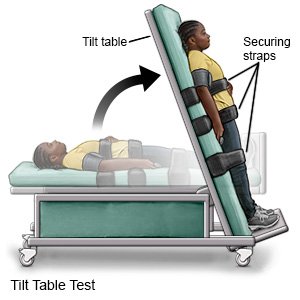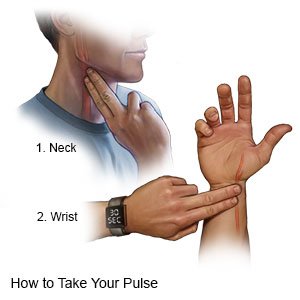Supraventricular Tachycardia
Medically reviewed by Drugs.com. Last updated on Aug 4, 2025.
What is supraventricular tachycardia (SVT)?
SVT is a condition that causes your heart to beat much faster than it should. SVT is a type of abnormal heart rhythm, called an arrhythmia, that starts in the upper part of your heart. It may last from a few seconds or hours to several days.
 |
What increases my risk for SVT?
- Health conditions such as anemia, a thyroid disorder, or heart problems
- Drinking caffeine, herbs, or using dietary supplements
- Dehydration
- Pregnancy
- Exercise, fever, or stress
- Smoking, drinking alcohol, or using illegal drugs such as cocaine
- Certain medicines, such as some heart medicines, bronchodilators, and decongestants
What are the signs and symptoms of SVT?
- A pounding, racing, or fluttering heartbeat
- Fatigue, weakness, or shortness of breath
- Feeling lightheaded, dizzy, or faint
- Pain, pressure, or tightness in your chest, neck, jaw, arms, or upper back
- Nausea
- Feeling anxious, scared, or worried that something bad may happen
How is SVT diagnosed?
Your healthcare provider will ask about other health conditions and your symptoms. He or she will also listen to your heart and lungs. You may need any of the following tests:
- Blood or urine tests are done to check for causes of SVT.
- An EKG is a test to record your heart rhythm and how fast your heart beats. It is used to check for problems with your heart. Your healthcare provider may do an EKG when you are resting, then again after you exercise. You may also need to wear a portable heart monitor at home for a short time.
- A chest x-ray shows a picture of your heart and lungs.
- An echocardiogram is a type of ultrasound. Sound waves are used to show the structure and function of your heart.
- A tilt table test checks your heart and blood pressure when your body changes positions.

- An electrophysiology study is a procedure to map the electrical pathways in your heart that control your heartbeat.
How is SVT treated?
Treatment will depend on what is causing your SVT and your symptoms. You may not need treatment or you may need any of the following:
- Medicines help control your heart rate and rhythm.
- Vagal maneuvers are ways to use your own body to slow down your heart rate. Your healthcare provider may have bear down like you are having a bowel movement. You healthcare provider may teach you how to do vagal maneuvers so you can do them at home.
- Carotid sinus massage is a type of massage to help slow your heart rate. Your healthcare provider will apply steady pressure to a blood vessel on one side of your neck. Do not do a carotid sinus massage on yourself or anyone else.
- Cardioversion is a procedure to return your heart rate and rhythm to normal. It can be done with medicine or an electric shock. You may need cardioversion if medicine does not work.
- Ablation is a procedure that uses a catheter to damage the small area of your heart that is causing abnormal electrical signals. This will stop the electrical problem and allow your heart to beat regularly.
Treatment options
The following list of medications are related to or used in the treatment of this condition.
How do I check my heart rate (pulse)?
Your healthcare provider will show you how to check your pulse, and how often to check it. Write down how fast your pulse is and if it feels regular or like it is skipping beats. Also write down the activity you were doing if your heart rate is above 100. Bring the information with you to your follow-up appointment.
 |
How can I manage or prevent SVT?
- Perform vagal maneuvers as directed when you have symptoms of SVT. Lie down flat and bear down like you are having a bowel movement. Do this for 10 to 30 seconds.
- Do not drink caffeine or alcohol. These can increase your risk for SVT.
- Keep a record of your symptoms. Write down what you ate or what you were doing before an episode of SVT. Also write down anything you did to make the SVT stop. Bring your record to follow up visits with your healthcare provider.
- Eat heart-healthy foods. These include fruits, vegetables, whole-grain breads, low-fat dairy products, beans, lean meats, and fish. Replace butter and margarine with heart-healthy oils such as olive oil and canola oil.

- Exercise regularly and maintain a healthy weight. Ask about the best exercise plan for you. Ask your healthcare provider what a healthy weight is for you. Ask him or her to help you create a safe weight loss plan if you are overweight.

- Do not smoke. Nicotine and other chemicals in cigarettes and cigars can cause heart and lung damage. Ask your healthcare provider for information if you currently smoke and need help to quit. E-cigarettes or smokeless tobacco still contain nicotine. Talk to your healthcare provider before you use these products.
- Manage other health conditions. Take medicine as directed and follow your treatment plan. Your healthcare provider may need to change a medicine you are taking if it is causing your SVT. Do not stop taking any medicine unless directed by your provider.
Call your local emergency number (911 in the US) or have someone call if:
- You have any of the following signs of a heart attack:
- Squeezing, pressure, or pain in your chest
- You may also have any of the following:
- Discomfort or pain in your back, neck, jaw, stomach, or arm
- Shortness of breath
- Nausea or vomiting
- Lightheadedness or a sudden cold sweat
When should I seek immediate care?
- You are dizzy, lightheaded, or feel faint.
- You have sudden numbness or weakness in your arms or legs.
When should I call my doctor?
- You have new or worsening symptoms.
- You have swelling in your ankles or feet.
- You have questions or concerns about your condition or care.
Care Agreement
You have the right to help plan your care. Learn about your health condition and how it may be treated. Discuss treatment options with your healthcare providers to decide what care you want to receive. You always have the right to refuse treatment. The above information is an educational aid only. It is not intended as medical advice for individual conditions or treatments. Talk to your doctor, nurse or pharmacist before following any medical regimen to see if it is safe and effective for you.© Copyright Merative 2025 Information is for End User's use only and may not be sold, redistributed or otherwise used for commercial purposes.
Learn more about Supraventricular Tachycardia
Treatment options
Care guides
Symptoms and treatments
Further information
Always consult your healthcare provider to ensure the information displayed on this page applies to your personal circumstances.
